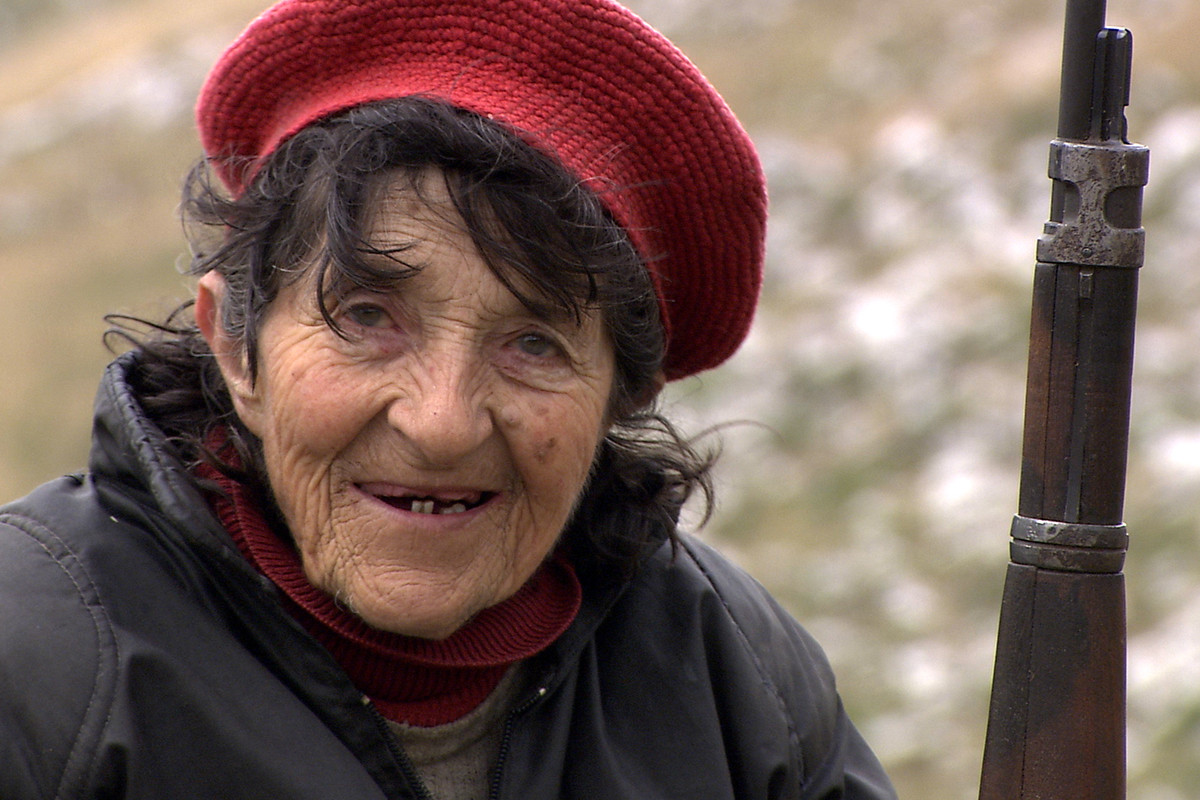At a Friday morning press conference, Darren Wilson was named as the police officer who killed Michael Brown in Ferguson, Missouri on August 9, 2014.
Ferguson Police Chief Tom Jackson, who was visibly nervous and refused to answer questions from reporters, uttered the name, along with a few sketchy details about Brown being stopped because he was a robbery suspect. Jackson had arrived late, with CNN reporting that he had consulted with legal counsel beforehand. Newsweek‘s Alexander Nazaryan noted that no reason had been offered to reporters for Jackson’s delay. On a FOX 2 raw feed, Jackson was reported hiding behind a van before approaching the mike. And when the time came for the Ferguson Police to distribute the appropriate packets to press, there were not enough to go around. The Ferguson Police Department distributed the first copies to reporters who had filed Sunshine requests. But the police did not provide an online link to the heavily redacted police report.
When Jackson fled from the microphone, several angry voices could be heard over the FOX 2 raw feed, with one unidentified man shouting, “There goes the trust again!”
Huffington Post Justice Reporter Ryan J. Reilly was good enough to take pictures of the press packet on Twitter. I have transcribed the two pages of the heavily redacted report that Reilly uploaded, along with the page of surveillance photos which the police have used to justify the charges against Michael Brown.
Here are the surveillance photos:
Here is the first page of the police report that Reilly scanned (and my transcription):
222 S Florissant Road, Ferguson, MO 63135
Report Date:
08/09/2014 11:51
Type of Incident
ROBBERY (F)
2ND—STRONGARM–CONVENINECE STO
Complaint No.
I4-12388
Case Status:
EXCEPTIONALLY
CLEARED
Supplemental Report:
Supp No.
0001
Date/Time:
8/11/2014 11:31 AM
ID
[Redacted]
Officer Name
[Redacted]
SUPPLEMENT
Pursuant to the original report, the following information is pertinent. On Monday 08/11/2014 @ 0900hrs, I was assigned the investigation.
_________ had come out of the restroom and returned to the counter where she observed Brown tell ____________________, that he (Brown) wanted several boxers of cigars. As ______________ was placing the boxes on the counter, Brown grabbed a box of Swisher Sweet cigars and handed them to Johnson who was standing behind Brown. ________________ witnessed ______________ tell Brown that he had to pay for those cigars first. That is when Brown reached across the counter and grabbed numerous packs of Swisher Sweets and turned to leave the store. ________________ then calls “911”. Meanwhile, ______________ comes out from behind the counter and attempts to stop Brown from leaving. According to _________________, _______________ was trying to lock the door until Brown returned the merchandise to him. That is when Brown grabbed _____________ by the shirt and forcefully pushed him back in a display rack. _________________ backed away and Brown and Johnson exited the store with the cigars.
(Cover Pages Only)
Printed 08/14/2014 1419
Here is the second page of the police report that Reilly scanned (and my transcription):
222 S Florissant Road, Ferguson, MO 63135
Officer/Incident Report
Report Date:
08/09/2014 11:51
Type of Incident
ROBBERY (F)
2ND—STRONGARM–CONVENINECE STO
Complaint No.
I4-12388
Case Status:
EXCEPTIONALLY
CLEARED
I then had the opportunity to review a copy of the video surveillance footage which captured the following events. The date and time stamps correspond to the video footage provided. The entire incident takes place on Saturday, 08/09/2014 between 11:52:58 hrs and 11:54:00 hrs.
Camera 3 – Exterior camera mounted on southwest corner of building, pointed east to record side of building and parking lot.
Camera 6 – Interior camera mounted on ceiling to record entry/exit doors.
Camera 7 – Interior camera mounted on ceiling to record counter/register.
The video reveals Brown enter the store followed by Jackson. Brown approaches the register with Johnson standing behind him. ___________________ can be seen in the background walking from the restroom to behind the counter. Brown hands a box of Swisher Sweets to Johnson. An apparent struggle or confrontation seems to take place with Brown, however it is obscured by a display case on the counter. Meanwhile, Johnson sets the box he was handed back on the counter. Brown turns away from the counter with another box of Swisher Sweet cigars and walks towards the exit door. ____________ then comes out from behind the counter, with what appears to be a set of keys in his hands. ______________ then stands between Brown and the exit door. Brown, still holding a box Swisher Sweets in his right hand, grabs _______________ by his shirt with his left hand. Brown aggressively pulls ________________ in close to him and then immediately pushes him back in to a display rack. Johnson continues out the door and out of camera frame. ______________, no longer between Brown and the door, stops and watches Brown as he walks towards the exit door. Brown then abruptly turns back around and advances on ________________. Brown towers over ______________ appearing to intimidate him. Brown then backs around and walks out of camera view.
It is worth mentioning that this incident is related to another incident detailed under Ferguson Police Report # 2014-12391 as well as St. Louis Police Report # 2014-43984. In that incident, Brown was fatally wounded involving an officer of this department. I responded to that scene and observed Brown. After viewing Brown and reviewing this video, I was able to confirm that Brown is the primary suspect in this incident. A second person, also at that scene, identified himself as being with Brown. That person was later identified as Dorian Johnson. After observing Johnson and reviewing the video I confirmed he is the second suspect in this incident.
A disc containing the 911 call made by ___________________ was obtained from Police Communications.
Reporting Officer
Approving Officer ( I )
[UPDATE: CNN has a PDF of the full police report.]
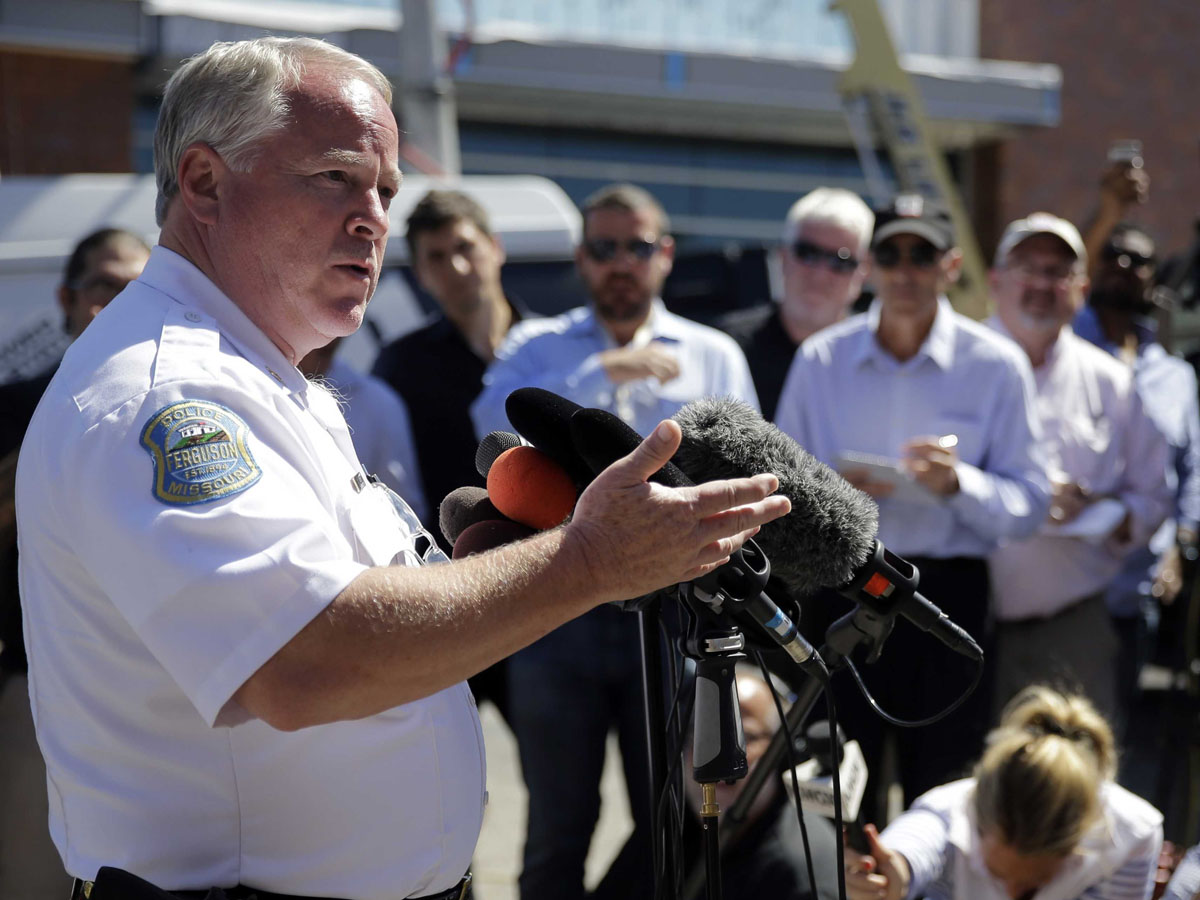
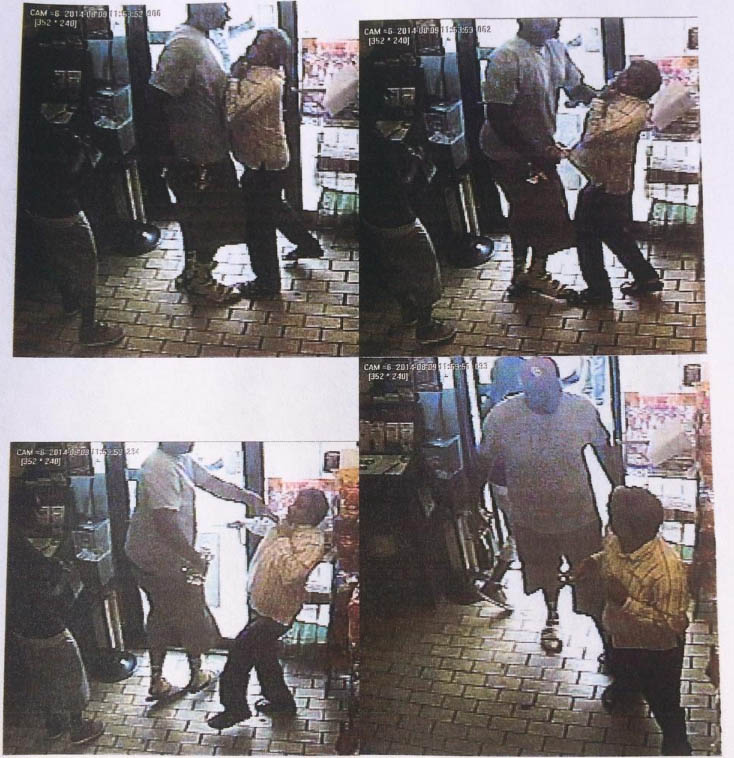
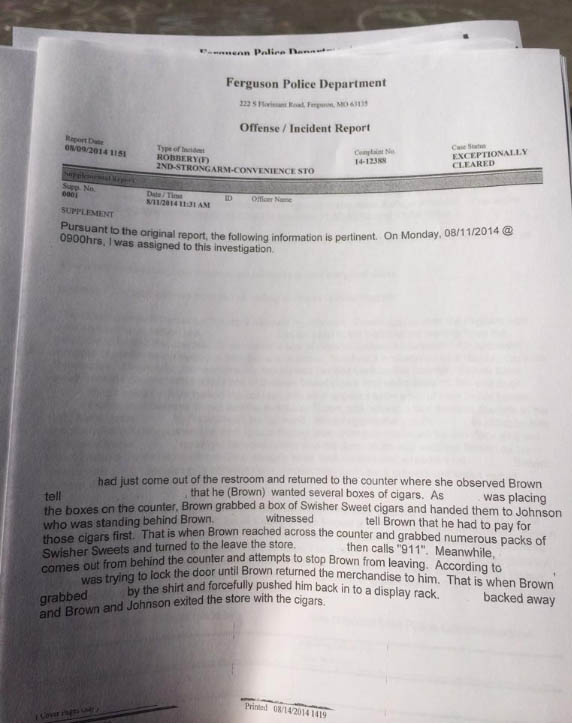
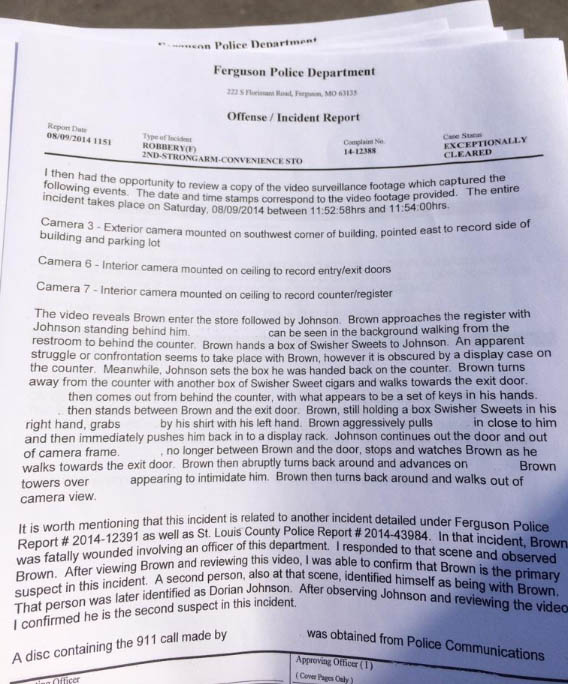
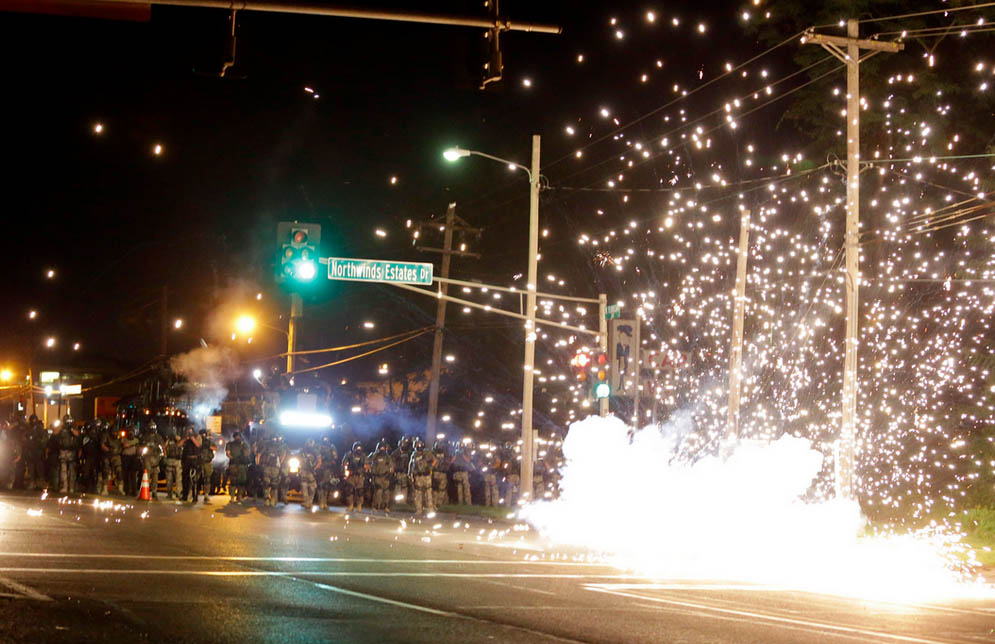
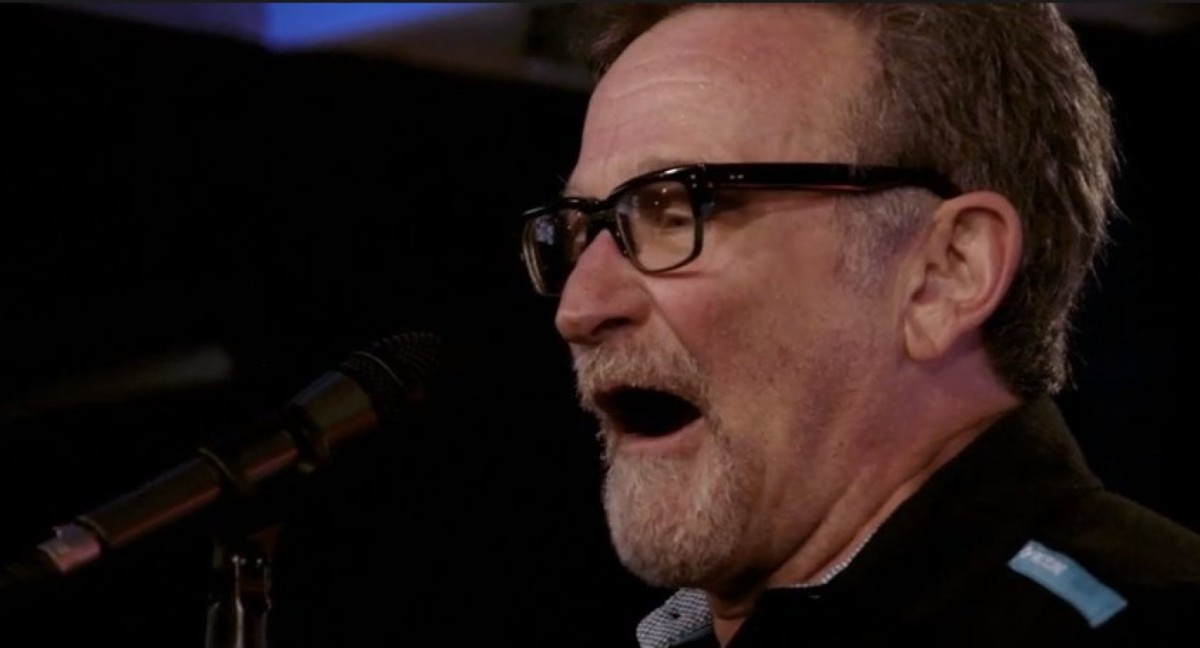
 Who knows how many beasts and wraiths Robin Williams confronted? One was too many. This was a terrible and needless loss that, irrespective of Williams’s talent and stature, demands that we take several steps back. We know that Williams was
Who knows how many beasts and wraiths Robin Williams confronted? One was too many. This was a terrible and needless loss that, irrespective of Williams’s talent and stature, demands that we take several steps back. We know that Williams was 